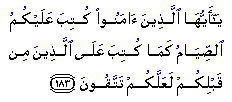Open Hearts, Sajdah, Three Kinds of Dua
Issue 593 » August 6, 2010 - Shaban 25, 1431
Living The Quran
Open Hearts
Al-Baqara (The Cow) Chapter 2: Verse 183
 "O Believers, Fasting (sawm) has been prescribed for you as it was prescribed for those before you, so that you may attain Taqwa (God-consciousness)"
"O Believers, Fasting (sawm) has been prescribed for you as it was prescribed for those before you, so that you may attain Taqwa (God-consciousness)"
This important announcement begins by addressing believers directly to remind them of who they are and of their status with God. God is aware that for believers to fulfil any religious obligation, regardless of its immediate benefits, they need encouragement and motivation. Hence they are addressed by their essential quality of having faith.
The verse establishes that fasting had been made obligatory for all believers, past, present and future, and that the aim behind it is to open their hearts to God and make them more conscious and fearful of Him. Therefore, the principal objective of fasting is to attain and refine this quality of Taqwa. Fasting, when observed in obedience to God, and in pursuit of His pleasure, instils and revives Taqwa in the human heart and acts as a safeguard against evil and wrongdoing.
For the Ummah (world-community) of Islam, whose duty is to undertake a campaign of struggle (Jihad), as a means of establishing God's universal order of mercy, peace, and justice, and who is to stand witness to the rest of mankind, it is only natural that fasting should be made obligatory. Fasting is a means of testing a person's determination and will-power, and an important aspect of his or her relationship with God. It is a discipline that teaches one how to rise above his or her physical needs and overcome the pressure of temptation in order to earn God's blessings and reward.
Compiled From:
"In the Shade of the Quran" - Sayyid Qutb, Vol. 1, pp. 182-184
Understanding The Prophet's Life
Sajdah
Consider these two Hadiths from the Sahih Muslim:
Ma'dan b. Talha reported: I met Thauban, the freed slave of God's Messenger, and asked him to tell me about an act for which, if I do it, God will admit me to Paradise, or I asked about the act which was loved most by God. He gave no reply. I again asked and he gave no reply. I asked him for the third time, and he said: I asked God's Messenger about that and he said: Make frequent prostrations before God, for you will not make one prostration without raising you a degree because of it, and removing a sin from you, because of it.
In the second Hadith, Rabi'a b. Ka'b said: I was with God's Messenger one night and I brought him water and what he required. He said to me: Ask (anything you like). I said: I ask your company in Paradise. He (the Prophet) said: Or anything else besides it. I said: That is all (what I require). He said: Then help me to achieve this for you by devoting yourself often to prostration.
Sajdah (prostration) is truly a humbling experience. We can beg for God's forgiveness and cry by thinking about our misdeeds, as well as seek refuge in God from the Hellfire. We are in one of the most submissive physical positions when in Sajdah. It is one of the best occasions to ask God for forgiveness, guidance, and all that we want. It is one of the best positions in which to talk to God. Seeking God's pleasure and forgiveness need to be given top priority in the days and nights of Ramadan.
Compiled From:
"What The Prophet did in Sajdah" - Abdul Malik Mujahid
Cool Concepts
Three Kinds of Dua
Prayer or supplication (Dua) is the essence of worship or servanthood to God. What rises to God from the whole creations is prayer. It has kinds and degrees:
1. The first kind is the prayer of all organisms, plant, animal and human, through the natural disposition of their bodies and their functioning in line with their duties in creation. This kind of prayer is always accepted.
2. The second kind is that which is uttered by all organisms, plant, animal, and human, in the tongue of vital needs. God meets these needs just on time, with the exception that plants, and the animals relatively weaker and less intelligent (as compared to others, such as wolves and foxes), are nourished more easily than the others. The more powerful and intelligent and more self-subsisting a creature is, the greater hardship it suffers to get nourishment.
3. The third kind of prayer is that which is done by human beings. This falls into two categories:
i. The first category is the active prayer. It means complying with the laws that God has set for life. For example, a farmer's ploughing the soil is knocking on the door of Divine providence. A patient's going to the doctor is appealing to God for cure. This kind of prayer is usually accepted.
ii. The second category is the verbal prayer that we do. This kind of prayer is also answered. But answering is different from accepting. God answers all the prayers done sincerely. However, He answers sometimes by giving whatever is asked for, sometimes by giving what is better, sometimes by postponing giving to the afterlife, and sometimes by not giving at all, since it will not turn out in favour of the one who prays. The way that God answers prayer depends on His wisdom.
Compiled From:
The Words, "The 23rd Word" - Said Nursi, pp. 333-334